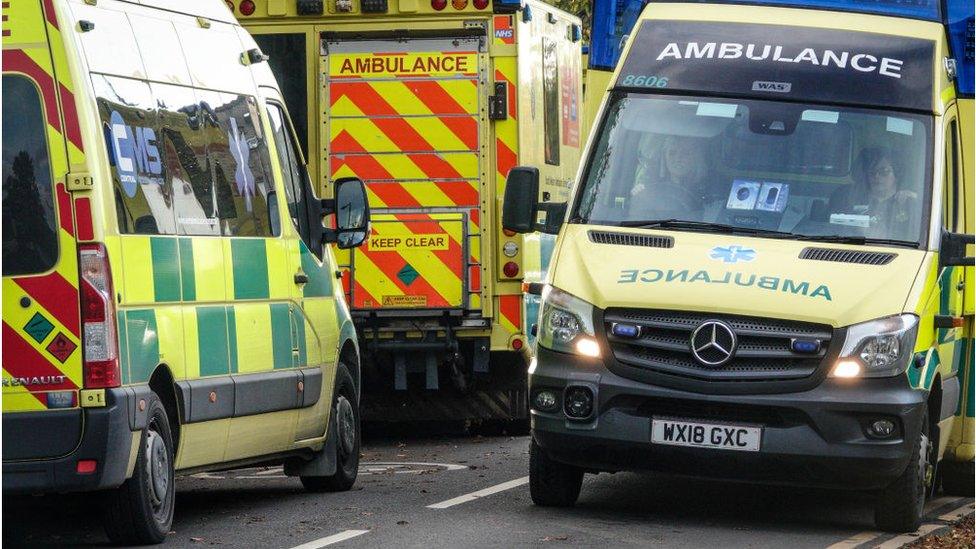NI Health: Emergency care pressures 'will cause more deaths'
- Published
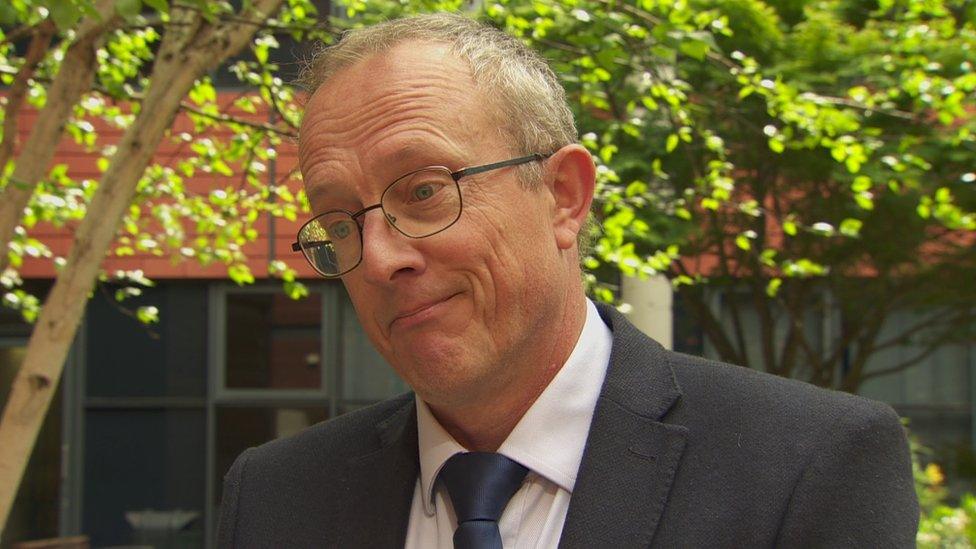
Dr Paul Kerr said there was "a dreadful crowding situation" at emergency departments in Northern Ireland
Emergency care pressures in Northern Ireland will cause more unnecessary deaths in the future, according to a senior doctor.
Dr Paul Kerr said there was currently "a dreadful crowding situation" at emergency departments (EDs).
He told The Irish News, external on Tuesday that the health service had experienced its worst winter on record.
The Department of Health said at midday on Tuesday almost 400 people were waiting to be admitted to hospital., external
Dr Kerr added that he expects the situation to get worse before spring.
"We have a dreadful crowding situation and we have perhaps 450 patients lying on trolleys at this moment in time, queuing literally to get into hospital for emergency treatment," he told BBC News NI.
"So you can expect that filters back into the ambulance system and causes delays in the response time and dreadful delays in the offload time.
"That's scandalous and shocking; in fact and is bound to lead to increased mortality."
Waiting time targets breached
On Tuesday at 10:00 GMT, it was reported that the average waiting time at Belfast's Royal Victoria Hospital was just over five and a half hours (332 minutes),
Current Department of Health targets state that 95% of all ED patients should be treated and either discharged or admitted to hospital within four hours.
The targets also state that no single patient should wait any longer than 12 hours for treatment.
However, at midday on Tuesday, there were 376 patients in EDs across Northern Ireland who had already been waiting for more than 12 hours.
Department of Health figures show:
The Belfast Health Trust had 95 patients waiting more than 12 hours at midday
The Northern Health Trust had 86 patients in the same position
The Western Health Trust had 66 patients breaching the 12-hour target
The South Eastern Health Trust - 65 patients
The Southern Health Trust - 64 patients
The department added that those figures provide "a snapshot of emergency departments at a particular point in time" and the situation can change very quickly.
On Tuesday evening, the Northern Health Trust issued an "urgent staff appeal" on social media, asking for nurses and nursing assistants to cover shifts at Antrim Area Hospital or Causeway Hospital.
Staff shortages continue to be a serious problem across the NHS and Rita Devlin, director of the Royal College of Nursing in Northern Ireland, said the pressure was taking its toll on nurses' mental health.
"I have never seen our workforce so distressed; so concerned about the care that they're having to give; so concerned about their patients that some of them feel that the only thing they can do is to leave."
Nurses in Northern Ireland came out on strike twice last month in protest over their pay and conditions.
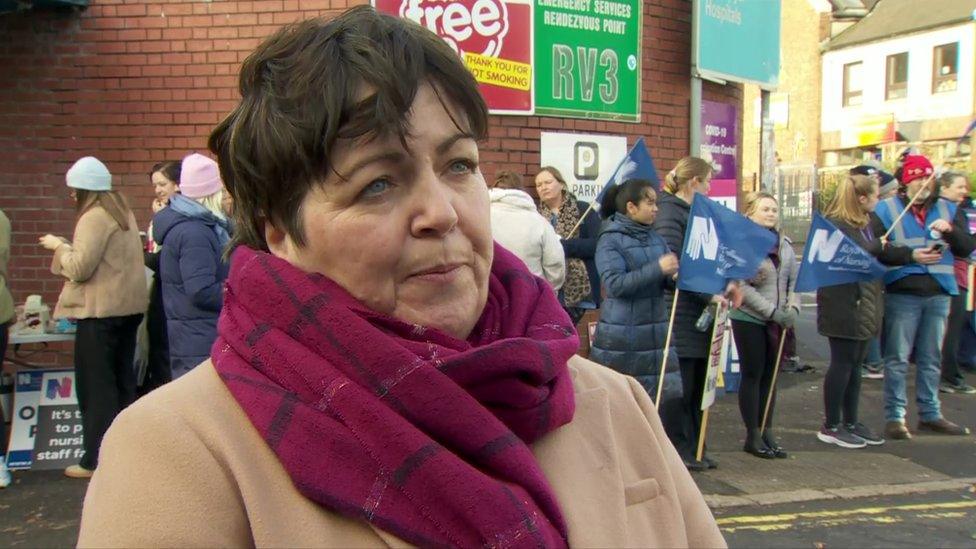
RCN director Rita Devlin, pictured on a nurses' picket line last month, said further strikes are "likely"
Speaking on the BBC's Evening Extra programme, Ms Devlin predicted that local nurses will take further strike action in February if the dispute is not resolved.
"I think unless the British government decides to speak to the Royal College of Nursing about pay as well as the other issues, I think it is probably likely, yes," she said.
Dr Kerr is vice-president of the Royal College of Emergency Medicine in Northern Ireland and is an emergency consultant based at the Royal Victoria Hospital.
'Moral injury'
He highlighted the impact that pressures were having on medical staff and said that there needed to be "more beds in the system".
He said the number of people lying in emergency departments was "progressively rising week on week".
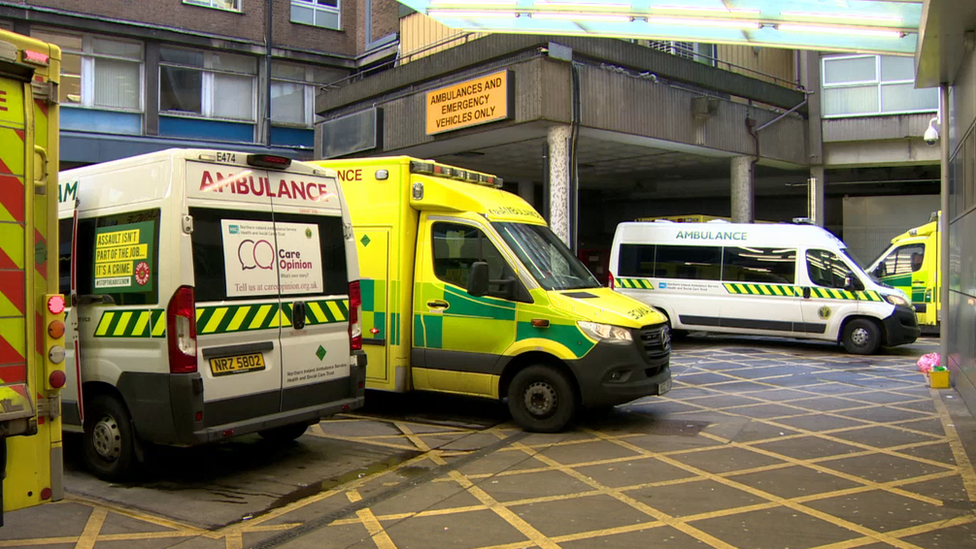
"At the moment the workforce is under great pressure," he explained.
"There are staff leaving because of this very problem and they are being brutalised by this system suffering what we would call moral injury.
"This is unfortunately a real phenomena where you are coming in in the morning and you witness a junior nurse or doctor crying, perhaps, because of the events the night before where they have had to suffer these conditions in an overly-busy department with very few staff," Dr Kerr said.

'Where's the hero to fix this?'
Pastor John Ashe of the Journey Community Church in Antrim said he witnessed "absolute chaos" while visiting his sick mother in hospital over Christmas.
She was treated in a room at Antrim Area Hospital for several hours before being transferred to a ward.
He said he and his wife faced a packed ED waiting room and a bed-lined corridor while attempting to locate his mother.
"To say there was no dignity at some of the things we witnessed was an understatement," he told BBC Radio Ulster's Talkback programme.
"There were things we saw which we shouldn't have seen... you could see the pressure and the strain."
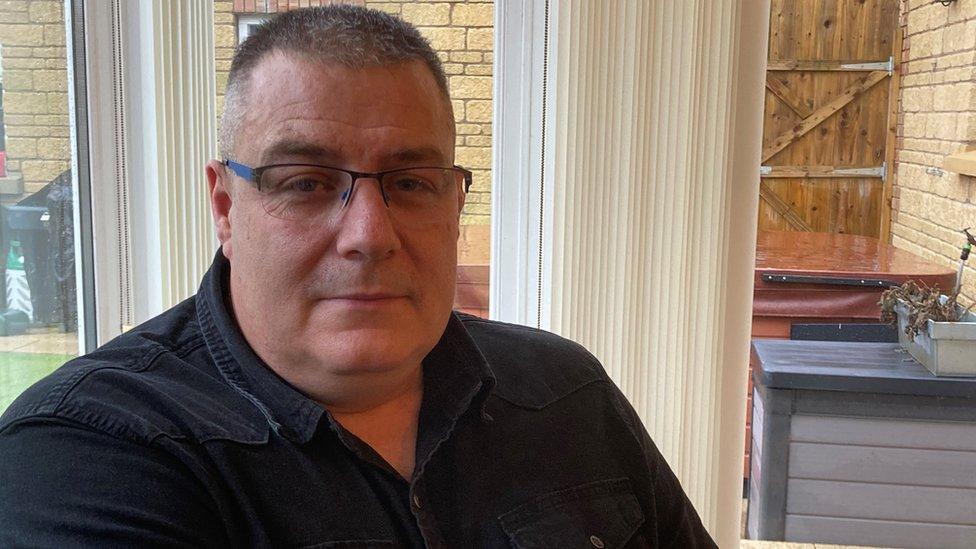
Pastor John Ashe described the "chaos"
He added staff were so overwhelmed he could not get an update on his mother's condition.
"It seemed like organised chaos, or just chaos," he said.
"I'm fairly used to seeing rough things as a pastor... but I was particularly shocked at what I saw that night on the faces of the staff."
Pastor Ashe urged politicians to take leadership to fix ongoing problems within the healthcare system.
"I'm left thinking... where's the hero to come and fix all of this?," he said.
"It is at a point now where I look at the dignity of those patients, and my mum and think: 'Is this where we've gotten to? Is this where we're at?'"
In a statement, the northern trust said it was "continuing to see unprecedented numbers of very ill people who require to be admitted to hospital".
It added that all available space was being utilised and staff were being stretched to "breaking point and beyond".
"If we take Antrim Hospital as an example, there are currently over 60 additional beds in use in places such as the discharge lounge, the day procedure unit and the direct assessment unit, all of which in normal circumstances would obviously be used for other things.
"Sadly, it is also inevitable that patients will also be in hospital beds in corridors where appropriate care will be being provided.
"When a hospital is working so far beyond capacity, the consequence is that it becomes less efficient as flow further slows down because the workforce is spread so thinly. "

'Mitigation measures'
In a statement, the Department of Health said that "as in other jurisdictions, hospitals across Northern Ireland remain under severe strain, resulting in growing numbers of patients experiencing prolonged waits in emergency departments".
"Unfortunately the situation in EDs (emergency departments) is reflective of the current pressures facing the entire health and social care system, as demand for services outweighs capacity.
"Mitigation measures were put in place ahead of the winter period.
"These include the winter plans highlighted by the then-health minister [Robin] Swann as well as measures announced jointly by trusts pre-Christmas."
It said that for the longer term, the department had "been clear on the need for sustained action to build greater capacity - including sustained, significant investment and reconfiguration of services".
"It remains vital that services are used responsibly and that hospital discharge processes are followed when people are deemed well enough to leave," the statement added.
It said that flu, Covid and other respiratory viruses were contributing to hospital pressures.
Related topics
- Published3 January 2023
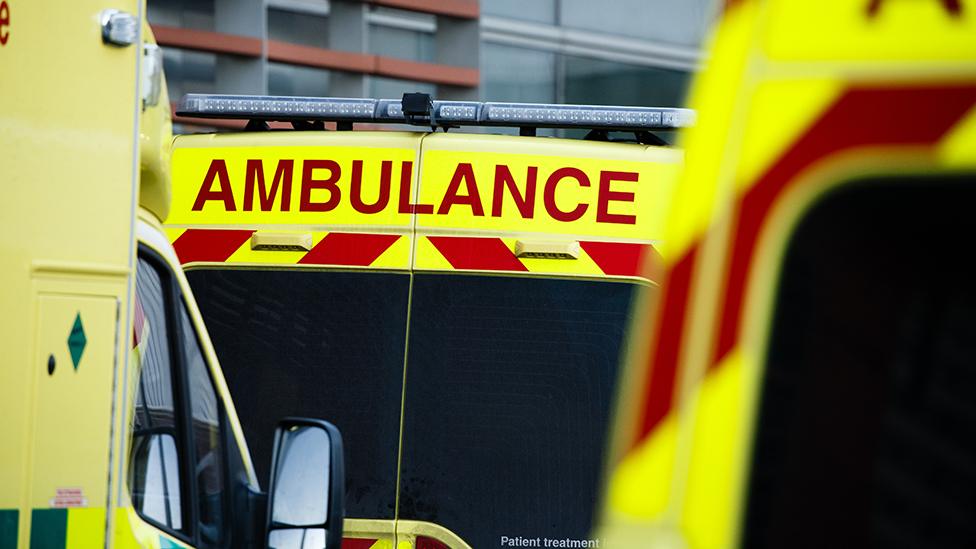
- Published30 December 2022
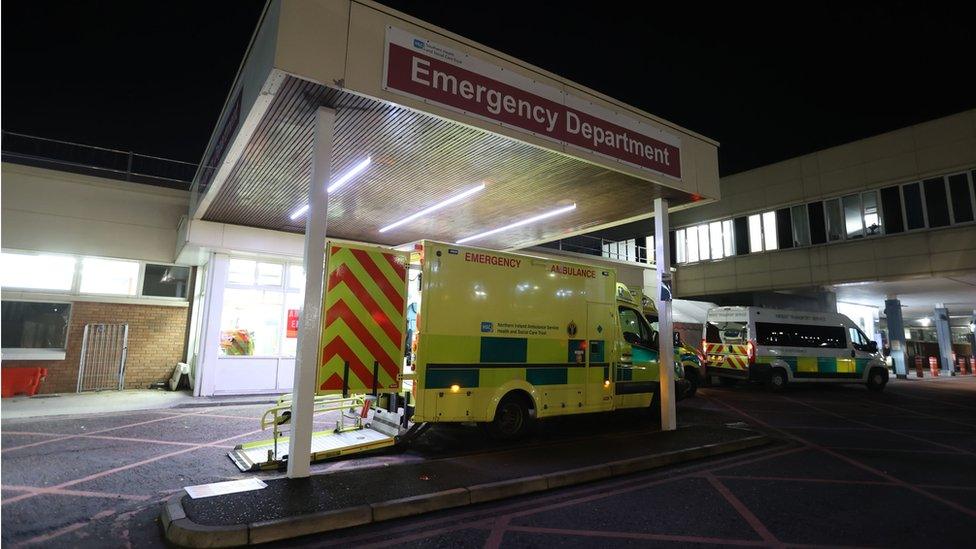
- Published31 December 2022
